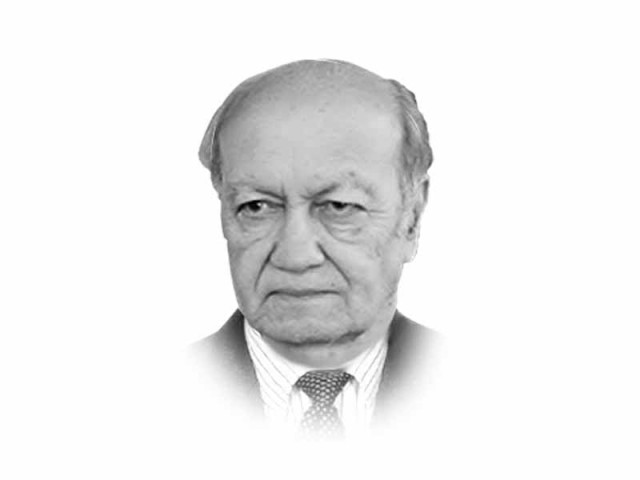Future trends in Pakistan-US relations
Pakistan’s importance to US will largely depend on its internal stability, contribution towards regional peace.

The writer is a retired lieutenant general of the Pakistan Army and served as chairman of the Pakistan Ordnance Factories Board
Public perception, however, of each other remains poor and mirrors the hostility built-up in the past. Hopefully, this will change, reflecting the new ambiance, provided the two countries are able to sustain this trend.
These are welcome developments, coming as they do in the backdrop of a very turbulent period when everything seems to be going awry, whether it was the shooting of two Pakistanis by CIA operative Raymond Davis, the Salala massacre or the humiliation suffered by Pakistan from the unilateral hunt for OBL that led to his assassination.
Despite the optimistic side of recent developments, this by no means is a transformative change and much would depend on how Islamabad and Washington view each other’s policies vis-a-vis their dealings with Afghanistan, Iran and India in the post-US withdrawal phase. Because, as of now, it is a very open question how Pakistan will manage its relations with the new leadership in the region. Equally significant in this equation would be how Pakistan handles its internal security problems. These factors will determine the future course and tone of the relationship.
This leads to the question as to what are the mutual expectations that are critical for building trust and continuity in the relationship. Pakistan expects the US will not abandon the region as it did during the 1990s. An assured commitment to stay engaged will depend on signing of the Bilateral Security Agreement by the Afghan government, chances of which appear to be fairly bright, as the two top contenders for the presidential election — Abdullah Abdullah and Ashraf Ghani — have expressed their willingness to sign the treaty. Better management of the western border should be a priority for Washington and Islamabad. A US perennial demand from Pakistan has been to deny sanctuary to the Haqqani network in North Waziristan. As US forces are withdrawing, this group that has already overstayed our hospitality should leave for Afghanistan. Pakistan and Afghanistan have to clear safe havens that are under the control of militants and are being used for launching attacks on each other’s territory. As long as the governments do not establish the writ of the state in their respective areas and continue patronising each other’s enemies, mutual trust will remain elusive and a major source of friction between the two countries and will also affect our relations with the US.
Ensuring an unhindered operation of Isaf Ground Lines of Communication in Afghanistan during the coming months will be essential for Pakistan. This is an international obligation and crucial for maintaining the confidence of US and Nato countries.
Since the last few months, the US has wisely suspended the use of drones in Pakistan. Its political damage far exceeded the tactical gains that it was supposed to bring. Moreover, it has deprived the rightist political parties of exploiting this major irritant to spew anti-American propaganda.
Another major hurdle is Washington’s opposition to the Iran-Pakistan gas pipeline project at a time when Pakistan is experiencing a severe energy crisis. American objection to this project sends a negative message and harms its image. The hard reality, however, is that until Iran and the P5+1 are able to reach a final agreement on Iran’s nuclear programme international sanctions will remain in force and Pakistan will have to grudgingly manage it.
Islamabad, like the rest of the world, would be closely watching the results of the forthcoming Indian and Afghan elections. If Modi was to win in India and Abdullah Abdullah elected president in Afghanistan, this would probably be the most desirable outcome from Washington and New Delhi’s point of view. Although Mr Sartaj Aziz and the Foreign Office spokesperson have reiterated that we will deal with whosoever comes to power, this development will require considerable finesse and skill in handling as this has implications on Pakistan-US relations and on regional and internal stability.
The Indo-US strategic partnership and their close ties are now a reality that Pakistan and the world are reconciled to. Washington’s insistence that India and Pakistan settle their differences on Kashmir at the bilateral level and that it will not play any facilitation role in resolving it is not new. New Delhi is not willing to accept any involvement of a third party in resolving disputes nor does it have the desire to resolve these at the bilateral level. Moreover, India feels it is a major regional and global player that cannot subject itself to mediation. For the US, India is a major destination of its investments and exports including military hardware. Besides, a close strategic partnership has developed between them in the last 10 years.
This, however, does not imply that it is a zero-sum game. Pakistan has its own importance due to its geostrategic position linking South with Central and West Asia, as a nuclear power and a state that can play a key role in the stability of Afghanistan. Finally, Pakistan’s importance to the US and the world in future will largely depend on its internal stability and contribution towards regional harmony and peace.
Published in The Express Tribune, May 7th, 2014.
Like Opinion & Editorial on Facebook, follow @ETOpEd on Twitter to receive all updates on all our daily pieces.



















COMMENTS
Comments are moderated and generally will be posted if they are on-topic and not abusive.
For more information, please see our Comments FAQ